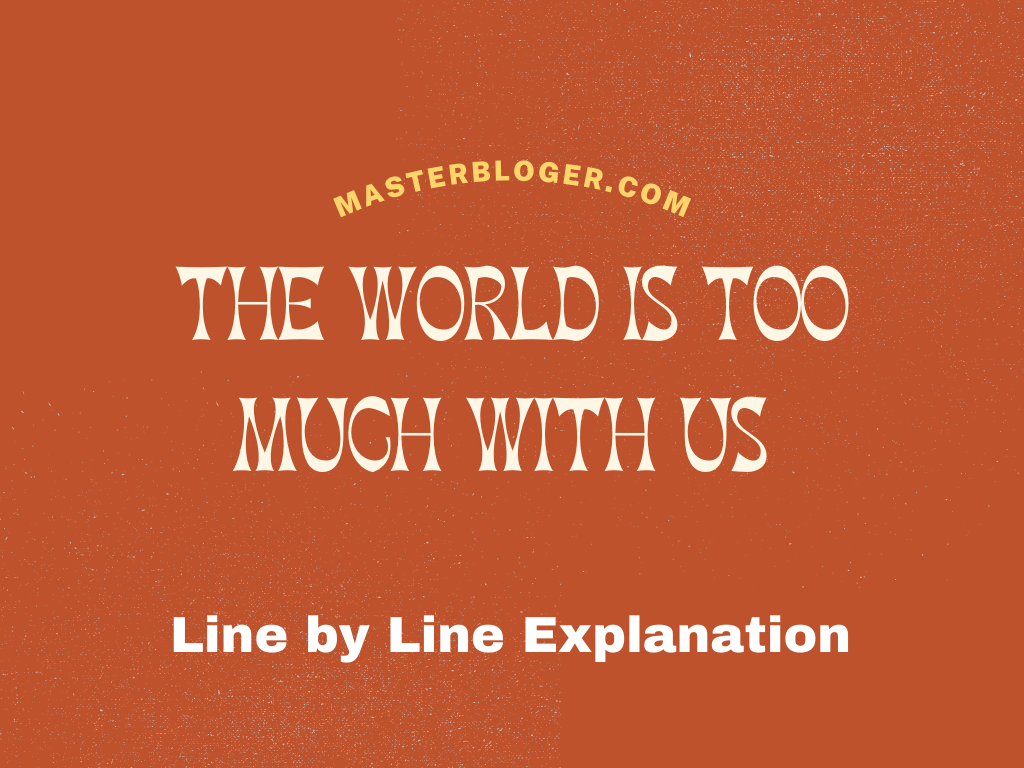Table of Contents
Poem
The world is too much with us; late and soon,
Getting and spending, we lay waste our powers;—
Little we see in Nature that is ours;
We have given our hearts away, a sordid boon!
This Sea that bares her bosom to the moon;
The winds that will be howling at all hours,
And are up-gathered now like sleeping flowers;
For this, for everything, we are out of tune;
It moves us not. Great God! I’d rather be
A Pagan suckled in a creed outworn;
So might I, standing on this pleasant lea,
Have glimpses that would make me less forlorn;
Have sight of Proteus rising from the sea;
Or hear old Triton blow his wreathèd horn.
The world is too much with us; late and soon,
Getting and spending, we lay waste our powers;—
Little we see in Nature that is ours;
We have given our hearts away, a sordid boon!
Paraphrasing
We are so attached to this world that we do not have time for any other thing. We are so much interested in this material world that we have no time for any other thing. We need to have an objective because these materials are useless.
All this word is based on the practice of getting and spending, but it should not be an aim itself, one lives his whole life in practicing getting to earn and spending without any objective and without any aim, without any philosophy. Here wordsworth is criticizing the world that earning must not be the sole aim of life.
While getting and spending we waste our powers. We have given so much importance to materialism that we lost all our energy, all our talent, all our capability, and all our time. We are so busy with these worldly tasks that we have no time for nature. Here poet is saying that we should own nature.
This is not something related to us but we belong to nature, it is our integral part. this is not something out, we are something outside of nature. The poet is saying that it seems like we have made a bargain, which is we have given our hearts away, we have sold our souls away. We have bought this materialistic world only, and he says that it is a bad bargain, because we have got a worthless thing in return.
In other words, the poet in this poem saying that our hearts are so attached to this world that we have no value, time or taste for nature.
This Sea that bares her bosom to the moon;
The winds that will be howling at all hours,
And are up-gathered now like sleeping flowers;
For this, for everything, we are out of tune;
The sea is revealing itself to the moonlight, in other words, the reflection of the moon is visible in the waves of the sea. The sky is clear and the moon is out. The poet then talks about the hauling sound of the wind when the wind blows at a high speed it produces a hauling sound at present it does not produce a hauling sound because it is blowing gently now.
Further, the poet says that when the wind blows gently at that moment the flowers are sleeping. He is saying that we have no taste, no time, no attraction for nature.
It moves us not. Great God! I’d rather be
A Pagan suckled in a creed outworn;
So might I, standing on this pleasant lea,
Have glimpses that would make me less forlorn;
Nature and such things have no impression upon us. They do not affect or influence us. In a state of desperation, depression, and disappointment he calls out God. He says that rather than be living among people who are believers, but have no value for nature, I would rather have been born in a traditional and old culture where people were even disbelievers but have taste and time for nature.
So I might be standing on a pleasant pasture and have some glimpses of nature and that would make me less lonely. He says that I will be in such a place where people are disbelievers but are near nature, so I will see things that would make me less lonely and which will remove my loneliness.
Or hear old Triton blow his wreathèd horn.
Have sight of Proteus rising from the sea; He says that standing on a beachside I will see the god of sea rising from it or hear the triton the god of telling future and watch the god singing with his flute.

Pingback: The world is too much with us By William Wordsworth - Literatureowl